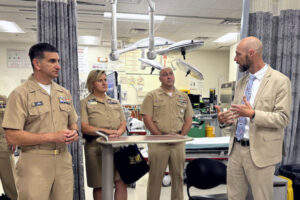
Story by Gloria Kwizera
U.S. Navy Bureau of Medicine and Surgery
Navy Medicine solidified its commitment to advancing healthcare education through a series of key events in Raleigh and Durham, North Carolina, June 6. These strategic partnerships benefit both military service members and the broader healthcare community.
Navy Medicine representative Rear Adm. Rick Freedman, Navy Deputy Surgeon General started the trip at a Hospital Corpsman Trauma Training (HMTT) Graduation Ceremony at the WakeMed Trauma Center in Raleigh, North Carolina.
“Today you leave here as the tip of the spear – the first line of defense, the difference between life and death,” said Freedman. “You embody Navy Medicine’s firm commitment to our fellow warfighters.”
HMTT graduates train alongside experienced WakeMed trauma professionals, gaining invaluable hands-on experience. This not only prepares them for military emergencies, but also equips them for future civilian healthcare careers. Freedman expressed his sincere appreciation for WakeMed’s dedication and expertise in fostering the mutually beneficial partnership.
“The skills you are teaching here, and all the knowledge gained by our corpsmen within the four walls of this world-class hospital and its first-class facilities will very likely be used aboard some future ship, like an aircraft carrier, a destroyer, or a submarine, or on some foreign land where it could be desert hot or arctic cold,” continued Freedman. “And the skills learned at HMTT will be used to help save the lives of America’s sons and daughters who have gone forward to protect our national interests and our way of life.”
Discussions centered on the future of healthcare education, highlighting the critical role of programs like HMTT in developing highly skilled healthcare professionals. The meeting also underscored the invaluable contributions of hospital corpsmen to both national security and civilian healthcare post-service.
“We cannot emphasize enough the importance of hospital corpsmen to the readiness of the Navy force,” stated Master Chief Hospital Corpsman Hansen Lafoucade, the deputy director of the Hospital Corps. “Thank you for all you do to help us ensure we continue to build the castle that is going to fortify our next fort to support the next mission, and next fight that we are going to be going into.”
Further solidifying the importance of these educational initiatives, a leadership meeting convened with Freedman, retired Vice Adm. Matthew Nathan, the 37th Navy Surgeon General, and retired Rear Adm. Donald Gintzig, WakeMed’s CEO and Rear Adm. Charles Harr, WakeMed chief medical officer.
“We’re extremely excited for the opportunity to engage and to see what a true partnership looks like,” expressed Dr. Gintzig. “It does take a team and we’re honored to take what we have at WakeMed, which is a very special environment, an incredible and talented team, and share what we know.”
The trip included a visit to Duke University, an institution with a longstanding collaboration with Navy Medicine. The visit focused on Duke’s role in advancing healthcare education for transitioning Navy hospital corpsmen through programs in critical fields like internal medicine, nursing, surgery, and physician assistance. These programs are rigorously designed to meet the demanding standards of both military and civilian settings, ensuring graduates are well-equipped for success.
Navy Medicine’s engagement with Duke and other universities signifies a steadfast commitment to student success. Extensive scholarship programs offered by Navy Medicine alleviate financial burdens and pave the way for rewarding healthcare careers.
“The education and support you provide makes our servicemen and women stronger. It is a powerful symbol of our mutual commitment to serving others.” concluded Freedman. “Through these crucial partnerships and ongoing dialogue, Navy Medicine not only bolsters the readiness of its forces but also strengthens the healthcare community.”
Navy Medicine – represented by more than 44,000 highly-trained military and civilian health care professionals – provides enduring expeditionary medical support to the warfighter on, below, and above the sea, and ashore.
For more information on Navy Medicine careers and to explore the unique scholarships and educational benefits available, including full tuition and specialized training opportunities, please visit https://www.navy.com/careers-benefits/careers/medical.
To learn more about the Hospital Corpsman Trauma Training program, visit https://www.med.navy.mil/Navy-Medicine-Operational-Training-Command/Hospital-Corpsman-Trauma-Training.